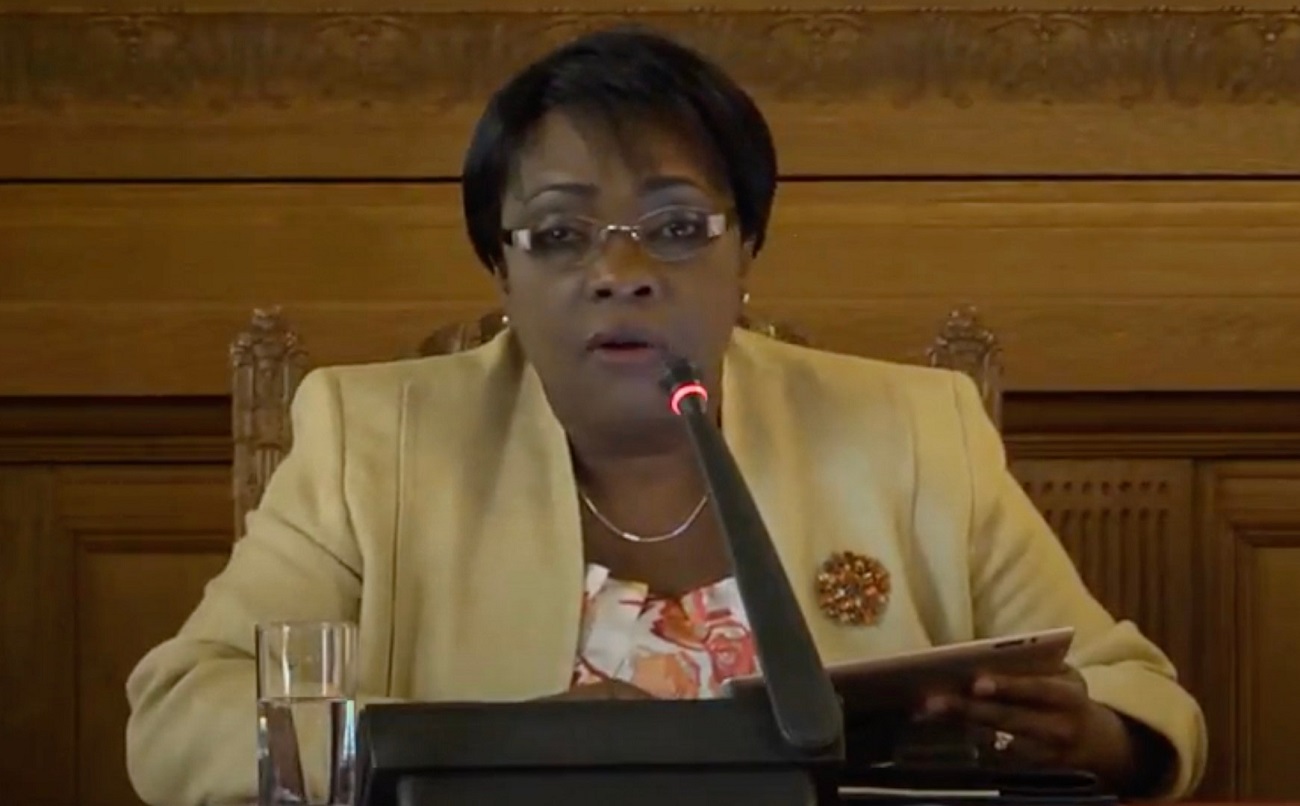Watan-As soon as the International Court of Justice issued its condemnation decision on the genocide charges brought by South Africa against Israel yesterday, all eyes turned to identify the Ugandan judge, Julia Sebutinde. She was the only one among the court judges who voted against the interim measures requested by the court against Israel in the midst of its aggression on Gaza, alongside Israeli judge Aharon Barak, in contrast to the majority of 15 votes in the International Court of Justice.
The International Court of Justice concluded on Friday that South Africa’s claim that Israel is committing genocide is plausible. The court issued a temporary order urging Israel to stop obstructing the delivery of aid to Gaza and improve the humanitarian situation.
In response to Sebutinde’s position, the Ugandan government stated that the judge “does not represent the country.”
#أوغندا تتبرأ من #القاضية “جوليا سيبوتيندي” وهي القاضية الوحيدة التي صوَّتت لصالح #إسرائيل ضد كل قرارات محكمة العدل الدولية التي طالبت إسرائيل باتخاذ تدابير لمنع الإبادة في #غزة. pic.twitter.com/4uUEGJBETX
— وطن. يغرد خارج السرب (@watanserb_news) January 27, 2024
Uganda’s representative responds Uganda’s permanent representative to the United Nations, Adonia Ayebare, tweeted on his account: “Judge Sebutinde’s position in the International Court of Justice does not represent Uganda’s position on the situation in Palestine.” He also published a video statement about his country’s opinion on the International Court of Justice’s decision.
Sebutinde claimed in her justification for her dissenting opinion that the measures announced by the International Court of Justice “have no justification because the jurisdiction of the court is limited to the Genocide Convention and does not extend to alleged violations of international humanitarian law” – according to CNN.
The position of the Uganda Government on the order by International Court of Justice ( ICJ) regarding the application of the convention on the prevention and punishment of the crime of genocide in the Gaza Strip ( South Africa v Israel) pic.twitter.com/JeKVROngSc
— Adonia Ayebare (@adoniaayebare) January 27, 2024
Who is the Ugandan Judge Julia Sebutinde?
But who is the Ugandan judge who refused to advocate for Gaza and sided with Israel, despite all the crimes committed by the occupying forces?
Julia Sebutinde was born in the central region of Uganda to government employee parents and a housewife with the title Simambo.
She attended Lake Victoria Primary School in Entebbe in the 1960s. She then joined Gayaza High School and later Kings College Budo, before enrolling at Makerere University to study law.
سيبوتيندي مِن أوغندا آثمةْ
لا ترى إبادةً فظيعةً ومُجرمةْعارضت حُكم القُضاةِ بعدما
قرّروا بأنّ غزّةً تعيشُ مظلَمةْيا لها مِن حيزبونَ قد طَغَت
وقادها إلى الهوانِ مشأمةْشتانَ بينها وبينَ مَن عَلَا
لامولا في لاهاي خاض ملحمةْعبدالعزيز التويجري
…………….
جوليا سيبوتيندي pic.twitter.com/AXARrWNVCT— عبدالعزيز بن عثمان التويجري🌍 (@AOAltwaijri) January 26, 2024
Julia Sebutinde graduated with a law degree in 1977 and obtained a Legal Practice Diploma from the Law Development Centre in Kampala in 1978. In 1990, she joined the University of Edinburgh for a Master’s degree in law, graduating in 1991.
In 2009, in recognition of her efforts and contribution to international justice, she was awarded an honorary doctorate in law from the University of Edinburgh. Sebutinde currently serves as the President of the International University of Health Sciences in Kampala, a position she has held since 2008.
Judge in the Supreme Court of Uganda
She first worked in the Ministry of Justice in the Ugandan government from 1978 to 1990. After graduating from the University of Edinburgh in 1991, she worked in the Commonwealth Secretariat in the United Kingdom. She later joined the Ministry of Justice in the Republic of Namibia, which had just gained independence at that time.
In 1996, she was appointed a judge in the Supreme Court of Uganda. In this capacity, she chaired three investigative committees related to the following government administrations:
- Corruption in the Ugandan Police Force
- Corruption in the Ugandan People’s Defence Forces
- Corruption in the Ugandan Revenue Authority
- The Special Court for Sierra Leone
-
🔴🔴هذه القاضية الوضيعة الأوغندية جوليا سيبوتيندي هي الوحيدة التي شذت مع القاضي الإسرائيلي اللذين صوتا لمصلحة إسرائيل-فقط- #محكمة_العدل_الدولي
وشذا عن أغلبية القضاة ال15 الآخرين الذين صوتوا لفرض إجراءات لضمان عدم ارتكاب انتهاكات لاتفاقية منع ارتكاب إبادة جماعية في #غزة…#ICJ… pic.twitter.com/f1itCfFF0s— عبدالله الشايجي Prof (@docshayji) January 26, 2024
International Court of Justice
In February 2012, she became the first African woman to be appointed as one of eight candidates for five judicial seats on the International Court of Justice.
In 2021, she was re-elected. Julia Sebutinde currently serves as a Ugandan judge at the International Court of Justice. She is also the current Chancellor of Mutesa I Royal University, a university owned by the Kingdom of Buganda. She is the first African woman to sit on the International Court of Justice.
She rejected the condemnation of the occupation
Despite serving in the court during three other genocide cases, in two cases where interim measures were requested, Sebutinde voted in favor. This includes the 2022 case between Ukraine and Russia, where she voted in favor of all three interim measures adopted, including Russia’s demand for an immediate halt to its military operations in Ukraine.
ستضحكون🤣
في رأيكم لماذا عارضت عضو محكمة لاهاي القاضي الأوغندية جوليا سيبوتيندي كل ما طالبت به جنوب إفريقيا، وانحازت لموقف إسرائيل؟ لسبب وجيه:
أنها ولدت في 7 أكتوبر 😂 في مدينة عنتيبي التي قتل فيها جوناثان نتنياهو (شقيق النتن) في عملية تحرير رهائن اختطفهم فلسطينيون!
هي متعاطفة😍 pic.twitter.com/CudBeKk5sy— azzedine mihoubi عزالدين ميهوبي (@azzedinemihoub3) January 26, 2024
However, she refused to condemn Israel for its ongoing crimes against the people of Gaza since October 7th last year, which some have described as a shameful stamp. Sebutinde voted against all six measures of the International Court of Justice. She now faces global criticism for her vote.
Many social media users have said that Ugandans should feel embarrassed. However, despite her vote, the United Nations court ordered Israel to take all measures within its power to prevent acts of genocide in the besieged territory.
